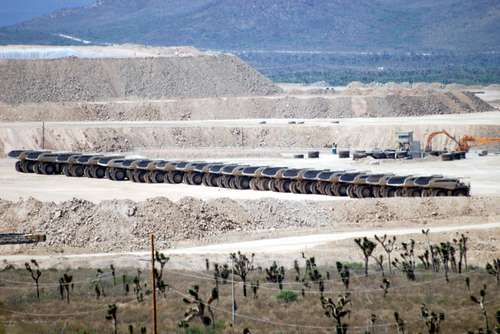Goldcorp ordered to pay $130 million to communal landowners in Zacatecas, Mexico
Published by MAC on 2011-04-27Source: La Jornada
Peñasquito is Mexico's largest open pit mine.
The TUA is a district tribunal that is part of the Federal Agrarian Tribunal of Mexico and the principal body in Mexico for dealing with land rights disputes (see: http://www.tribunalesagrarios.gob.mx/).
It has now ordered Canada's Goldcorp - the world's fourteenth largest mining company - to pay US$130 million to local landowners as "rent" for use of their lands, more than a thousand hectares of which has been taken over by Goldcorp.
The minesite has also been targeted by residents for alleged pollution.
Peñasquito mine has two open pits (Peñasco and Chile Colorado) containing gold, silver, lead and zinc and is Mexico's largest open pit operation. The mine commenced commercial production in September 2010 (with full production of 130 000 t/d by early 2011).
Over its 23-year mine life, Penasquito is expected to produce an annual average of 500 000 oz of gold, 28-million ounces of silver, 450-million pounds of zinc, and 200-million pounds of lead.
he company also plans to develop a "satellite network" of smaller mines to feed into the larger operation, including the Camino Rojo project.
Goldcorp ordered to pay $130 million to communal landowners in Zacatecas, Mexico
Alfredo Valadez Rodriguez
La Jornada
9 April 2011
The Agricultural Tribunal considers insufficient the $5 million given to farmers of El Vergel in Michoacán. Another transnational company promises to pay $3.3/per ton of iron to communal landowners in Nahua.
 |
| View of the open pit mine at Peñasquito Photo: Alfredo Valadez Ramirez, La Jornada |
Yesterday, the Agrarian Court of Zacatecas made a decided over a legal dispute related to the Peñasquito open pit mine: the ejidatarios (communal landowners) will receive 130 million pesos as compensation for mining on their lands.
Zacatecas, Zac. - The Agrarian Tribunal (TUA, Spanish acronym) of Zacatecas ordered Canadian mining company Goldcorp, which operates the Peñasquito mine, the largest open pit gold mine in Latin America - to pay 130 million pesos to the communal landowners of El Vergel, in the municipality of Mazapil.
In its decision on the legal action brought by the peasants in late 2009, the Tribunal found the amount of 5 million pesos paid by the company to the farmers to be insufficient rent for an area of over a thousand hectares.
The TUA's resolution (court file number 13/3/2009) stipulates compensation of 130 million pesos for the four years that Goldcorp has exploited the land via renting surface rights from the land owners.
Opens the door to a new contract
This decision nullifies the 2007 contract between the mining company and the communal landowners of El Vergel, and requires the Canadian company and the farmers to come to a new agreement in which a higher price is to be paid the owners of the land from which Goldcorp extracts gold, silver, zinc and copper.
In the preamble to the TUA's decision, it clearly states that the ruling was favourable to the landowners, many of whom were able to show that the community assembly in which the original contract was signed with the company was not valid.
The analysis to determine the validity of the original contract sited multiple irregularities, including the fact that the company's lawyers, with support of PRI municipal authorities, put pressure on some farmers to authorize the agreement on the mine without delay, an accusation made by many farmers at that time in the local and national media.
Another reported irregularity held that different amounts were given as payment for rent to various members of the El Vergel community, despite all members having the same land rights.
Since work began in 2007 on the Peñasquito open mine pit, there have been at least five major protests by the communal landowners against the Canadian consortium, including a mobilization in May 2009 when farmers and their families blocked all access to the mine to demand fair pay for the rent of their land.
Issues such as environmental pollution in the area of the Mazapil valley and a breach of the promise of employment on the mine site to farmers and their families (which Goldcorp justified on the grounds that farmers did not have the technical background required), provoked other demonstrations.
Supported by civil society organizations in Zacatecas such as the Popular Front for Struggle (Frente Popular de Lucha), the dissatisfied farmers launched a legal battle to demand fair compensation, similar to that signed with the community of El Carrizalillo in the state of Guerrero where the same Canadian company operates the Los Filos mine, but paid better rates to farmers in that region.
Although the mining company had an agreement with the farmers to provide certain payments, the principle demand was for a new contract, a demand which had to be taken to court to be resolved. With the TUA's decision, the communal landowners in Mazapil may receive similar compensation to that paid to the peasants in El Carrizalillo, once the new contract is signed.
In Michoacán, the Nahua communal landowners in the municipality of Aquila finally reached an agreement with representatives of the multinational company Ternium. The company agreed to pay 3.3 dollars per ton of iron extracted from the Las Encinas mine, bringing to an end a work stoppage begun on January 30th of this year.
At the community assembly held Thursday evening, the 469 indigenous residents accepted the proposal of mining company director Carlos Dominguez Ahedo. Still pending resolution is payment of severance pay and employee benefits for some workers. On Friday morning, dozens of 40-ton trucks resumed transporting ore to the state of Colima.
With information from Ernesto Martínez, Correspondent